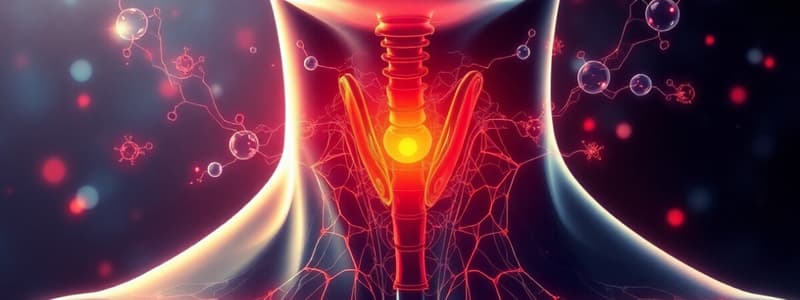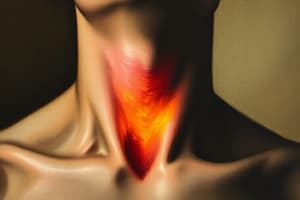Podcast
Questions and Answers
What is the primary function of calcitonin produced by the thyroid gland?
What is the primary function of calcitonin produced by the thyroid gland?
Which hormone is directly responsible for increasing the basal metabolic rate (BMR)?
Which hormone is directly responsible for increasing the basal metabolic rate (BMR)?
How do T3 and T4 hormones affect the cardiovascular system?
How do T3 and T4 hormones affect the cardiovascular system?
What is the precursor hormone to Triiodothyronine (T3)?
What is the precursor hormone to Triiodothyronine (T3)?
Signup and view all the answers
Which of the following effects is NOT caused by T3 and T4 hormones?
Which of the following effects is NOT caused by T3 and T4 hormones?
Signup and view all the answers
What is one of the main symptoms of hyperthyroidism?
What is one of the main symptoms of hyperthyroidism?
Signup and view all the answers
Which physiological process is stimulated by T3 and T4 to help regulate cholesterol levels?
Which physiological process is stimulated by T3 and T4 to help regulate cholesterol levels?
Signup and view all the answers
Which type of thyroid cancer is the most common?
Which type of thyroid cancer is the most common?
Signup and view all the answers
What is one psychological effect of excess T3 and T4 hormone levels?
What is one psychological effect of excess T3 and T4 hormone levels?
Signup and view all the answers
What causes a goitre to form?
What causes a goitre to form?
Signup and view all the answers
Which of the following hormones is primarily produced by the parafollicular (C) cells of the thyroid gland?
Which of the following hormones is primarily produced by the parafollicular (C) cells of the thyroid gland?
Signup and view all the answers
Hashimoto's Disease is characterized by which of the following?
Hashimoto's Disease is characterized by which of the following?
Signup and view all the answers
What is the primary function of parathyroid hormone (PTH)?
What is the primary function of parathyroid hormone (PTH)?
Signup and view all the answers
Which enzyme is responsible for breaking down fats during digestion?
Which enzyme is responsible for breaking down fats during digestion?
Signup and view all the answers
What is a key role of insulin in the body?
What is a key role of insulin in the body?
Signup and view all the answers
Which of the following statements is true regarding the thyroid gland?
Which of the following statements is true regarding the thyroid gland?
Signup and view all the answers
Which hormone is responsible for reducing blood calcium levels?
Which hormone is responsible for reducing blood calcium levels?
Signup and view all the answers
What triggers the release of thyroid-stimulating hormone (TSH)?
What triggers the release of thyroid-stimulating hormone (TSH)?
Signup and view all the answers
Which of the following is a symptom of hyperthyroidism?
Which of the following is a symptom of hyperthyroidism?
Signup and view all the answers
What is the primary function of insulin?
What is the primary function of insulin?
Signup and view all the answers
Which condition is characterized by the destruction of beta cells in the pancreas?
Which condition is characterized by the destruction of beta cells in the pancreas?
Signup and view all the answers
What autoimmune condition involves elevated TSH and low T3 and T4 levels?
What autoimmune condition involves elevated TSH and low T3 and T4 levels?
Signup and view all the answers
What is a common treatment for individuals with Hashimoto's Thyroiditis?
What is a common treatment for individuals with Hashimoto's Thyroiditis?
Signup and view all the answers
What role does obesity play in type 2 diabetes?
What role does obesity play in type 2 diabetes?
Signup and view all the answers
What role do T3 and T4 play in children's development?
What role do T3 and T4 play in children's development?
Signup and view all the answers
What is the minimum iodine intake required in a week for proper thyroid function?
What is the minimum iodine intake required in a week for proper thyroid function?
Signup and view all the answers
What triggers the hypothalamus to release thyrotropin-releasing hormone (TRH)?
What triggers the hypothalamus to release thyrotropin-releasing hormone (TRH)?
Signup and view all the answers
Which autoimmune condition is commonly linked to hypothyroidism?
Which autoimmune condition is commonly linked to hypothyroidism?
Signup and view all the answers
What is the primary function of glucagon?
What is the primary function of glucagon?
Signup and view all the answers
What is a common symptom of hyperthyroidism?
What is a common symptom of hyperthyroidism?
Signup and view all the answers
Which process occurs to form T3 and T4 from iodide?
Which process occurs to form T3 and T4 from iodide?
Signup and view all the answers
What type of feedback mechanism regulates T3 and T4 secretion?
What type of feedback mechanism regulates T3 and T4 secretion?
Signup and view all the answers
What is a common symptom of both Type 1 and Type 2 diabetes?
What is a common symptom of both Type 1 and Type 2 diabetes?
Signup and view all the answers
Which symptom is associated with hypothyroidism?
Which symptom is associated with hypothyroidism?
Signup and view all the answers
How is Type 2 Diabetes typically managed?
How is Type 2 Diabetes typically managed?
Signup and view all the answers
What is the normal range for fasting blood glucose levels?
What is the normal range for fasting blood glucose levels?
Signup and view all the answers
What is a potential consequence of untreated Type 1 Diabetes?
What is a potential consequence of untreated Type 1 Diabetes?
Signup and view all the answers
Which type of diabetes occurs during pregnancy?
Which type of diabetes occurs during pregnancy?
Signup and view all the answers
Which hormone inhibits the release of both insulin and glucagon?
Which hormone inhibits the release of both insulin and glucagon?
Signup and view all the answers
Study Notes
Thyroid Gland and Pancreas
- The thyroid gland and pancreas are endocrine glands regulating metabolism, growth, calcium homeostasis, and blood glucose levels.
The Thyroid Gland
- Role: Regulates metabolism and calcium levels.
- Thyroxine (T4): Precursor to T3, crucial for metabolism; consists of four iodine atoms and one molecule of tyrosine.
- Triiodothyronine (T3): Active form of thyroid hormone, contains three iodine atoms.
- Calcitonin: Produced by parafollicular (C) cells; reduces calcium in the blood, opposing parathyroid hormone (PTH).
Effects of T3 and T4 in Adults
- Basal Metabolic Rate (BMR): Increases BMR by 60-100% above normal.
- Beta Receptors: Enhances sensitivity to catecholamines (e.g., adrenaline).
- Growth and Development: Promotes growth, especially in nervous system and organs.
- Thermoregulation: Increases heat production, maintaining body temperature.
- Cardiovascular: Increases cardiac output and causes peripheral vasodilation.
- Digestive System: Increases motility, leading to appetite increase and diarrhea.
- Cerebral Activity: Enhances mental activity but can cause nervousness and anxiety.
- Glucose Metabolism: Enhances glucose uptake, glycolysis, and gluconeogenesis.
- Cholesterol Metabolism: Aids liver in processing and removing excess cholesterol.
Effects of T3 and T4 in Children
- Nervous System Development: Essential for development and growth.
- Skeletal and Muscle Growth: Promotes growth of bones, muscles, and organs.
Formation of T3, T4, T1, and T2
- Iodine Intake: Approximately 1 mg of iodine is required weekly in the diet, absorbed as iodide.
- Iodide Transport: Thyroid gland transports iodides from blood to epithelial cells and follicles.
- Iodine Oxidation: Iodide ions are oxidized to form iodine atoms.
- Thyroglobulin and Tyrosine: Iodine binds to thyroglobulin; tyrosine forms T1, T2, T3, and T4.
Regulation of T3 and T4 Secretion
- Stimuli: Low T3, T4 levels or low temperature stimulate TRH release.
- TRH and TSH: TRH triggers anterior pituitary to release TSH.
- Thyroid Response: TSH increases T3 and T4 production.
- Negative Feedback: Increased T3 and T4 inhibit release of TRH and TSH.
Thyroid Disorders
- Hypothyroidism: Iodine deficiency, Hashimoto's thyroiditis, or, rarely, trauma.
- Symptoms: Extreme sleepiness, muscle sluggishness, slowed heart rate, reduced blood pressure, weight gain, constipation, mental slowness, hair loss, dry skin.
- Hyperthyroidism: Graves' disease, thyroiditis, other causes.
- Symptoms: Heat intolerance, increased sweating, skin flushing, weight loss, diarrhea, tachycardia, and increased blood pressure. Nervousness, fine tremor, exophthalmos.
The Pancreas
- Exocrine Function: Produces digestive enzymes (amylase, proteases, lipases).
-
Endocrine Function:
- Insulin: Released by beta cells, promotes glucose uptake, glycogenesis, and lipogenesis; inhibits lipolysis and protein breakdown; reduces blood glucose levels.
- Glucagon: Released by alpha cells, stimulates glycogenolysis, gluconeogenesis, and lipolysis; increases glucose levels.
- Somatostatin: Inhibits insulin and glucagon release, regulates endocrine function and neurotransmission.
- Pancreatic Polypeptide (PP): Regulates pancreatic secretion, influences hepatic glycogen levels, and affects gastrointestinal secretions.
Disorders of the Pancreas
-
Diabetes Mellitus:
- Type 1: Autoimmune condition destroying beta cells; requires insulin administration.
- Type 2: Insulin resistance or reduced insulin sensitivity, often related to obesity; managed with lifestyle changes, oral medication, or insulin.
- Other types: gestational diabetes, Latent autoimmune diabetes in adults (LADA), Maturity-onset diabetes of the young (MODY).
Multiple Choice Questions (MCQs)
- Questions about hormones regulating calcium levels, the triggers for TSH release, symptoms of hyperthyroidism, and insulin's function are included.
Clinical Cases
- Case 1 (Hashimoto’s Thyroiditis): Pathophysiology, role of autoimmunity, and treatment options.
- Case 2 (Type 2 Diabetes Mellitus): Role of insulin resistance, impact of obesity, and treatment strategies.
Studying That Suits You
Use AI to generate personalized quizzes and flashcards to suit your learning preferences.
Related Documents
Description
Explore the functions and impacts of the thyroid gland and pancreas in regulating metabolism, calcium levels, and blood glucose. Learn about the hormones produced, such as thyroxine and triiodothyronine, and their physiological effects in adults.




